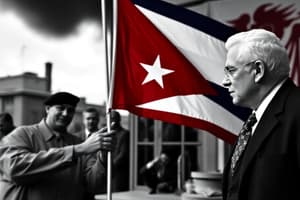Podcast
Questions and Answers
What aspect of the Cold War arms race made it so terrifying?
What aspect of the Cold War arms race made it so terrifying?
Both the US and Soviet Union developed Hydrogen bombs which were more destructive than atomic bombs. Each side knew that they would destroy each other if they had to use the bombs.
Identify changes that took place during the Cuban Revolution.
Identify changes that took place during the Cuban Revolution.
Support from the Soviet Union; nationalized businesses; most land under government control; restricted political freedom; critics jailed or silenced; collectivization of farms.
What was the 'Red Scare'?
What was the 'Red Scare'?
Americans feared that communists inside the US might try to undermine the US government.
Identify the goals of MLK Jr.
Identify the goals of MLK Jr.
What was the intent of the Marshall Plan?
What was the intent of the Marshall Plan?
Describe the Great Leap Forward and the Cultural Revolution.
Describe the Great Leap Forward and the Cultural Revolution.
Who led the Great Leap/Cultural Revolution reform programs?
Who led the Great Leap/Cultural Revolution reform programs?
What happened to the defeated Chinese Nationalists?
What happened to the defeated Chinese Nationalists?
What were the results of Gorbachev's perestroika?
What were the results of Gorbachev's perestroika?
How did the East German government respond to Gorbachev's call for change?
How did the East German government respond to Gorbachev's call for change?
During the Korean War, which nation provided hundreds of thousands of troops to help North Korea?
During the Korean War, which nation provided hundreds of thousands of troops to help North Korea?
What was the US position regarding Vietnam immediately following WWII?
What was the US position regarding Vietnam immediately following WWII?
What is the significance of the 17th & 38th parallels?
What is the significance of the 17th & 38th parallels?
Why is South Korea considered one of the Four Asian Tigers?
Why is South Korea considered one of the Four Asian Tigers?
What role did the Viet Cong play in Vietnam?
What role did the Viet Cong play in Vietnam?
Identify problems the US faced by supporting Diem.
Identify problems the US faced by supporting Diem.
What types of economies exist in North and South Korea?
What types of economies exist in North and South Korea?
Identify social changes that took place in South Korea following WWII.
Identify social changes that took place in South Korea following WWII.
What is the significance of the Tet Offensive?
What is the significance of the Tet Offensive?
Flashcards are hidden until you start studying
Study Notes
Cold War Arms Race
- Development of hydrogen bombs by both the US and Soviet Union significantly increased destructive capabilities beyond atomic bombs.
- Mutually assured destruction led to a pervasive sense of nuclear doom among both nations.
Cuban Revolution
- Gained support from the Soviet Union, transitioning towards socialist/communist politics.
- Nationalized businesses and most farmland fell under government control.
- Political freedoms were restricted; critics faced silencing or imprisonment, prompting many to flee to Florida.
- Toppled the previous authoritarian regime and collectivized farms, creating a centralized socialist economy.
Red Scare
- Fear among Americans of potential communist infiltration within the US government.
- Led to McCarthyism, where suspected communists were aggressively pursued based on unsubstantiated accusations.
Goals of Martin Luther King Jr.
- Aimed to secure equal rights for all, particularly focusing on African Americans.
Marshall Plan
- Designed to bolster democratic governments in Europe post-World War II, aiding in economic recovery.
Great Leap Forward & Cultural Revolution
- Great Leap aimed to massively increase agricultural and industrial production through collective effort.
- Cultural Revolution sought to eliminate bourgeois influences and reinforce communist ideologies within China.
Leadership During Reforms
- Mao Zedong led both the Great Leap Forward and the Cultural Revolution reform programs.
Chinese Nationalists Post-Defeat
- After their defeat in the Chinese Civil War, the Nationalists retreated to Taiwan.
Gorbachev's Perestroika
- Introduced reforms that shifted decision-making responsibilities from central planners to factory managers and allowed farmers to sell produce in the free market.
- Results included economic turmoil as traditional systems were disrupted.
East Germany's Response to Gorbachev
- Initially resisted calls for reform but eventually moved rapidly towards unification with West Germany by dismantling the Berlin Wall and ousting key communist leaders.
Korean War Support
- China provided hundreds of thousands of troops to assist North Korea during the Korean War.
US Position on Vietnam Post-WWII
- The United States imposed a trade embargo against Vietnam immediately after World War II.
Parallels Significance
- The 17th parallel served as the dividing line between North and South Vietnam.
- The 38th parallel marked the separation between North and South Korea.
South Korea's Economic Status
- Recognized as one of the "Four Asian Tigers" due to its rapid industrialization and development of a prosperous middle class with direct elections.
Viet Cong's Role in Vietnam
- Communist guerrilla forces sought to overthrow the South Vietnamese government, contributing to the conflict in the region.
Challenges Supporting Diem
- Specific challenges faced by the US in supporting South Vietnamese leader Ngo Dinh Diem remain to be elaborated.
Economies of Korea
- South Korea operates under a prosperous market economy with a thriving middle class and democratic elections.
- North Korea functions as a command economy, tightly controlled by the state.
Social Changes in South Korea Post-WWII
- Detailed social changes following World War II in South Korea are yet to be clarified.
Tet Offensive Significance
- The Tet Offensive was a significant turning point in American public opinion regarding the Vietnam War, occurring unexpectedly during the Vietnamese New Year.
Studying That Suits You
Use AI to generate personalized quizzes and flashcards to suit your learning preferences.



